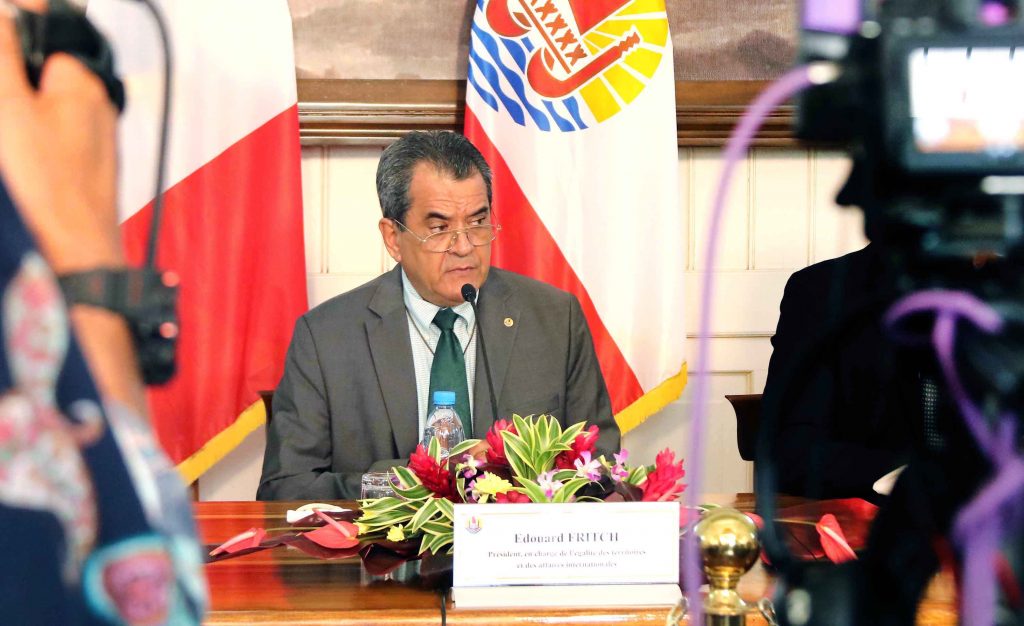For the past week, trade unions in French Polynesia have been negotiating with the government of President Édouard Fritch. Strike notices were filed, and then tumultuous discussions erupted over the clear set of demands. It was the government’s refusal to give in to the five main demands that triggered mobilizations. On Wednesday, November 24, four of the five trade union confederations began a strike with a common platform for their workers in both the public and private sectors, to which some specific demands were added for particular employers.
First and foremost, the strike in Polynesia is in line with the demands of the ongoing mobilizations in other French territories, particularly Guadeloupe and Martinique. Wage increases and an end to mandatory vaccinations are at the heart of the strike. The unions are demanding a 4 percent wage increase to keep up with the rising cost of living, but the government offered only 2 percent in the negotiations — less than the 2.8 percent increase in food prices last year reported by Tahiti Infos. As for vaccinations, which are slated to be compulsory on December 23, the unions say that 15,000 workers do not want to be vaccinated at the moment and they are demanding the measure be repealed.
The government’s response on the vaccines is laughable: it has proposed lowering the fine for noncompliance! It’s an obscene gesture aimed at keeping the measure in place while negotiating the level of oppression and stigmatization of the non-vaccinated population. Keenly aware that, just as in other places, Polynesia could not function if all non-vaccinated people were fired, the government has proposed to prohibit dismissals. The unions have made it clear that that is not enough.
There are three other aspects of this strike that are more specific to the particular situation in the Polynesian archipelago that predate the pandemic: the population’s rejection of the reform of the Social Security Fund (CPS), the application of an old agreement to establish an unemployment fund, and application of a law to protect local employers.
Faced with the government’s intransigence, the union confederations CSTP-FO, CSIP, O oe to oe Rima, and Otahi, as well as several autonomous unions, made the call for the general strike that began on Wednesday.
By Shutting Down the Economy, Workers are Challenging the Relationship of Forces
The mobilizations include strategic sectors such as the aeronautics industry, with airport firefighters paralyzing many flights with their strike. The port of Papeete and its customs zone is also affected, with the strikers affecting the movement of pharmaceutical and perishable products. The energy sector is also affected, but managers at natural gas and fuel suppliers are saying that for the time being they will be able to “withstand the strike,” claiming their tanks are full. But communication from this sector already looks like an arm-wrestling match, and the situation is worsening. Finally, the postal and delivery services felt the strike’s effect from the beginning. Francetvinfo reports that 24 percent of employees walked out at the Post and Telecommunications Office (OPT), forcing half the offices to close.
In every sector, the employer organizations and the are leading an offensive aimed at criminalizing striking workers, accusing them of choosing the “worst time” — what they claim to be a period of economic recovery — for this mobilization.
For the time being, the situation in Polynesia is less explosive than in Guadeloupe or Martinique. While the unions have announced they will hold daily pickets, no roadblocks or demonstrations have yet been planned.
The events currently taking place in the other “overseas” territories where France maintains its colonial stranglehold go beyond the traditional framework strikes and transcend the existing union and political organizations. Polynesian political leaders have expressed their fear that the mobilizations will spill over, too, given what is happening elsewhere. For right now, this is a pressure strike, aimed at getting the bosses back to the negotiating table. The trade unions’ leaderships are laying groundwork, showing that they can mobilize “sectors that are well known and that risk paralyzing the country just a bit,” as Tahiti Infos puts it.
These mobilizations in the territories still under the domination of French colonialism express a global social discontent that goes well beyond the issues of vaccines and even wages. Despite repression, the workers’ movement in France and the rest of the world should stand in solidarity and oppose authoritarianism and the deeply pro-business policies of governments, including the management of the health crisis itself.
First published in French on November 25 in Révolution Permanente.
Translation by Scott Cooper










